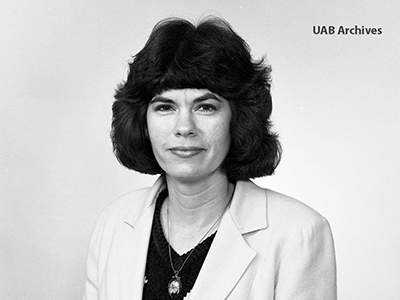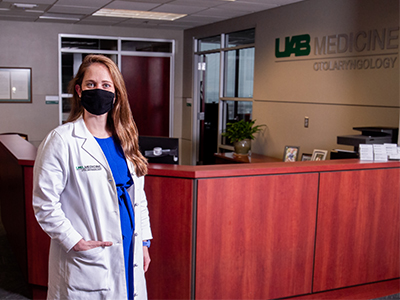For Women’s History Month, celebrated annually in March, we are celebrating a woman in Otolaryngology who made history at the UAB School of Medicine and helped shape the future of the specialty.
"Women can’t do that" is a phrase Alice Morgan, M.D., the first woman to graduate from the Otolaryngology residency program, used as motivation to write history. Her father told her she would make a good secretary, but she wanted to practice medicine.
Although Morgan comes from a family of doctors, she was discouraged from pursuing medicine. “He told me, ‘Women can’t do that,’” said Morgan. Alice Morgan, M.D.
Alice Morgan, M.D.
She was determined to prove women can be more than homemakers. She earned a bachelor’s degree in zoology from Auburn University and was prepared to apply for medical school in 1969.
“The dean of the graduate school said, ‘Why should we accept you? You’re a woman, you’re just going to get pregnant.’ That was very discouraging,” said Morgan.
Despite feeling defeated, Morgan kept pushing towards her goals through academic achievements. She continued her education and earned her master's degree and doctorate in anatomy and physiology at Auburn University. At that point, almost a decade had passed since Morgan first applied to medical school, but she was still determined to pursue her dreams. Thankfully, an opportunity opened.
“There was a big change in the attitude toward women in medicine over those years. I didn’t have people telling me ‘women can’t do that,' anymore,” said Morgan.
She applied and was accepted to medical school at UAB in 1978. She was one of 35 women in a class of 165.
“I think the biggest challenge, in the beginning, was trying to stand up for myself when someone was being critical only because I was a woman, but I never let anyone run over me,” said Morgan. “I called people out and everyone started gaining respect for each other over time.”
The perception of women in medicine was shifting, but Morgan still had to find her place in a male-dominated field.
“A guy was lecturing on the autonomic nervous system of the head and neck. No one was answering him and I knew all the answers so I started answering,” said Morgan. “Dr. James Hicks, the director of the Otolaryngology program, turned around like, ‘Who is this person?’”
After the lecture, Dr. Hicks invited Morgan to scrub in on a head and neck case and was told she would "fit well in ENT." This was an affirmation of her hard work and resilience.
She was accepted into the Otolaryngology Residency Program as the only female in a surgical residency at UAB at the time.
“I finished in 1987, and I was still the only female in the ENT program,” said Morgan.
Morgan currently practices in Cullman, Alabama. She is active in her community and is past president of the Alabama State Otolaryngology Society. She paved the way for many other women by fighting for herself, standing up for what she believed in, and challenging existing norms.
Now, women represent 45 percent of the Otolaryngology residency program and one-third of the department’s faculty.
“I felt very accepted in the department as a female and had many female co-residents,” said Jessica Grayson, M.D., a recent residency graduate and now an assistant professor in the Department of Otolaryngology.
 Jessica Grayson, M.D.Grayson says she did not face overt discrimination during her training. Instead, she often received words of encouragement from the predominantly male faculty on the importance of not allowing the job to limit other aspects of her life. However, she did struggle to overcome some of the challenges of being a woman physician.
Jessica Grayson, M.D.Grayson says she did not face overt discrimination during her training. Instead, she often received words of encouragement from the predominantly male faculty on the importance of not allowing the job to limit other aspects of her life. However, she did struggle to overcome some of the challenges of being a woman physician.
“As someone who wanted children, I struggled with trying to find the "best" time to have a family — to limit the effects on my training. I did have a child in residency training and received an incredible amount of support from co-residents and faculty. Despite the pressure I put on myself to be everything for everyone, co-residents, faculty, and spouses of faculty members stepped up to support my family, keep my child when he was sick, or support my goal of breastfeeding. I can only hope that other women receive that kind of support in the future and that I can help perpetuate that culture within our department. I was very lucky that I did not feel like having a baby negatively affected the way I was perceived by my peers and attendings, however, I know for a lot of women in surgery that is not their reality,” said Grayson.
As a full-time surgeon, wife, and mother, Grayson, like many other women in medicine, has difficulty juggling the demands of the job and domesticity.
“I have learned that it's not work-life balance, it's work-life juggle and it’s important to know which things must always take priority and which things can be deferred for a day or two,” said Grayson.
Despite the strides made in diversity throughout medicine over the years, women still face bias, inequality, glass ceilings, and gender pay gaps.
“If we could all buy in to take care of each other, promote each other, support one another, and call out unfairness when we see it, we could go a long way at leveling the playing field for everyone who is trying to succeed in this career and provide exemplary care to patients,” said Grayson.
The efforts of women like Morgan and Grayson continue to shine a light on what women can accomplish, as well as women’s multi-faceted abilities to lead, inspire, and impact those around them. The two continue to inspire women to pursue their dreams despite the barriers and challenges.
 For Women’s History Month, celebrated annually in March, we are celebrating a woman in Otolaryngology who made history at the UAB School of Medicine and helped shape the future of the specialty.
For Women’s History Month, celebrated annually in March, we are celebrating a woman in Otolaryngology who made history at the UAB School of Medicine and helped shape the future of the specialty.